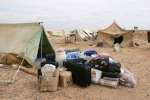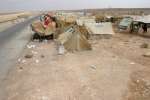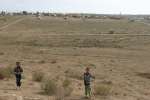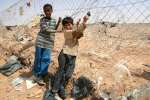- Text size
 |
|  |
|  |
| 
- Français
UNHCR chief urges adherence to humanitarian principles in Gaza conflict
News Stories, 5 January 2009

GENEVA, January 5 (UNHCR) – UN High Commissioner for Refugees António Guterres on Monday called for strict adherence to humanitarian principles in the continuing conflict in Gaza, including respect for the universal rights of those fleeing war to seek safety in other states.
Although there has been no large-scale movement out of Gaza because of a blockade, Guterres reminded neighbouring states of their responsibility to provide access to safety for those civilians fleeing violence.
"Those who are compelled to flee the Gaza Strip should be able to do so and to find safety and security in other countries according to international law," he said. "I thus urge that all borders and access routes concerned should be kept open and safe, and Palestinians endeavouring to leave Gaza should not be prevented from doing so."
Guterres also expressed strong support and solidarity for UNHCR's sister organization, the UN Relief and Works Agency (UNRWA), which is in charge of providing support to Palestinians and is struggling to carry out its mission in Gaza's steadily worsening humanitarian environment.
"It is absolutely imperative that the immediate delivery of humanitarian assistance to the civilian victims of this conflict be facilitated, including access from Egypt and Israel," the High Commissioner said. "We call on the international community and all humanitarian actors to support UNRWA's efforts to help the innocent victims."
UNHCR has provided some emergency assistance to Egypt's Red Crescent Society in case it is needed for the care of any Palestinians admitted to Egyptian territory. The refugee agency stands ready to deploy an emergency team and equipment to the area as required.
The High Commissioner expressed grave concern over the conflict's toll on civilians.
"The heavy casualties suffered by innocent civilians, including many children, are heartbreaking," said Guterres. "As a humanitarian agency which must deal with the repercussions of violence and persecution worldwide, UNHCR expresses its profound shock and sadness at the suffering and loss of life we are now seeing. I join Secretary-General Ban Ki-moon in calling for an immediate cessation of all violence."






































